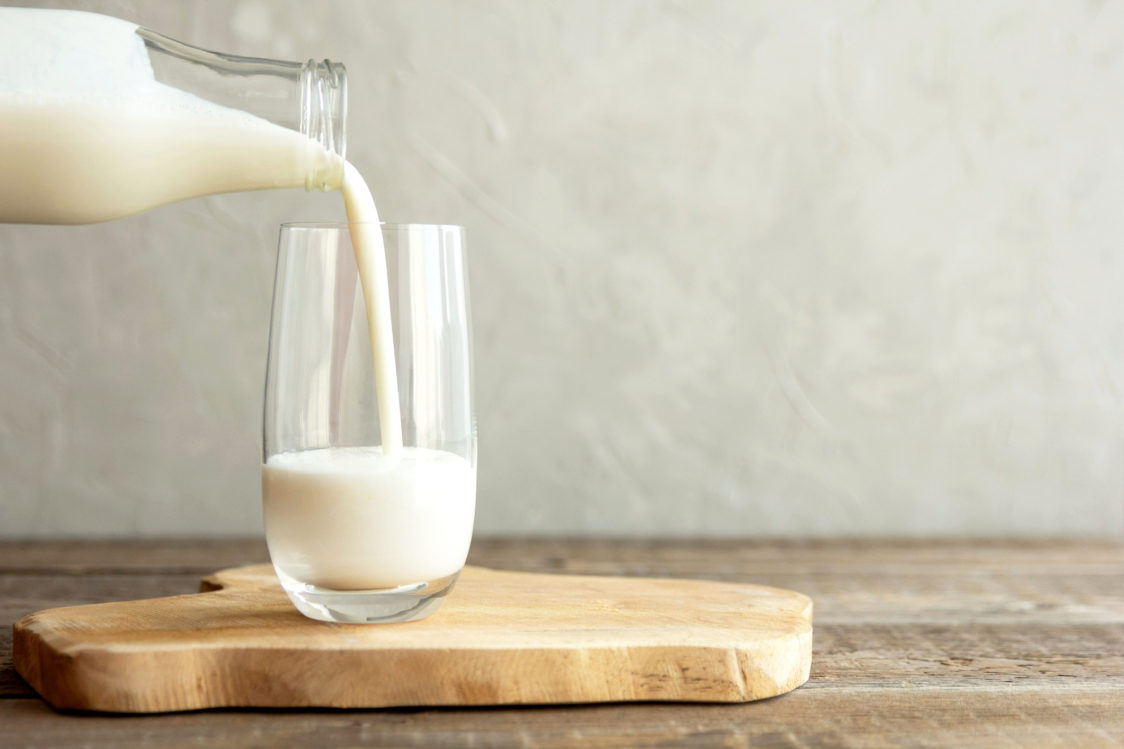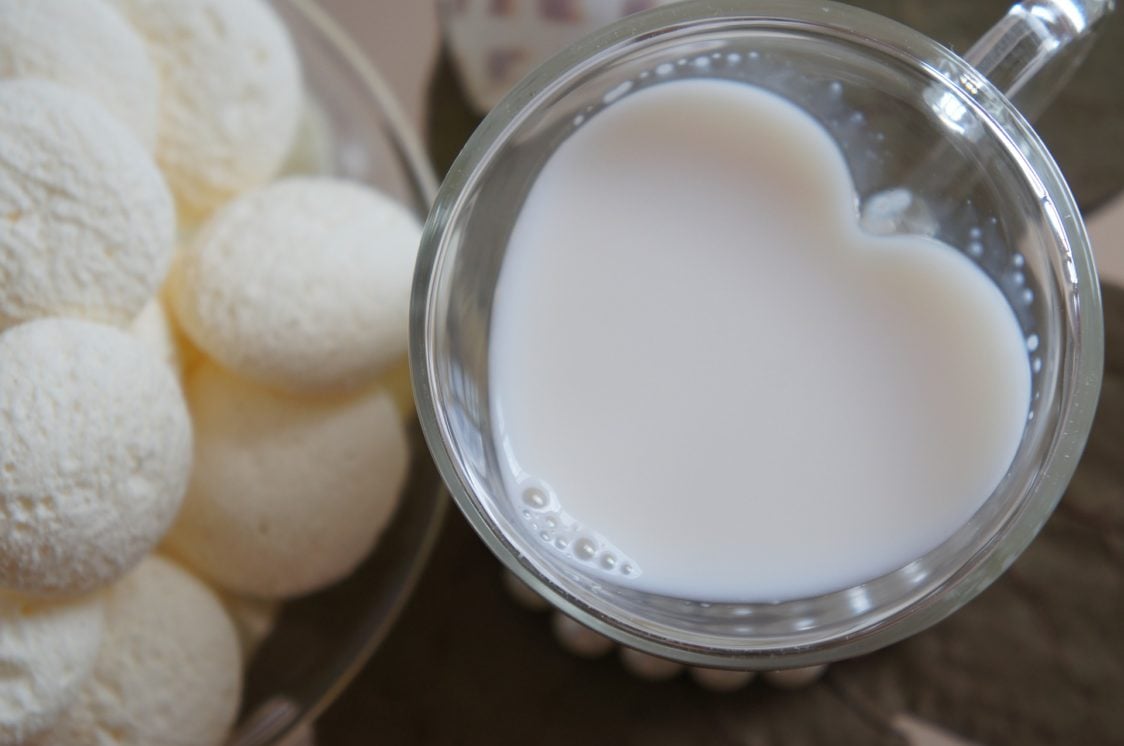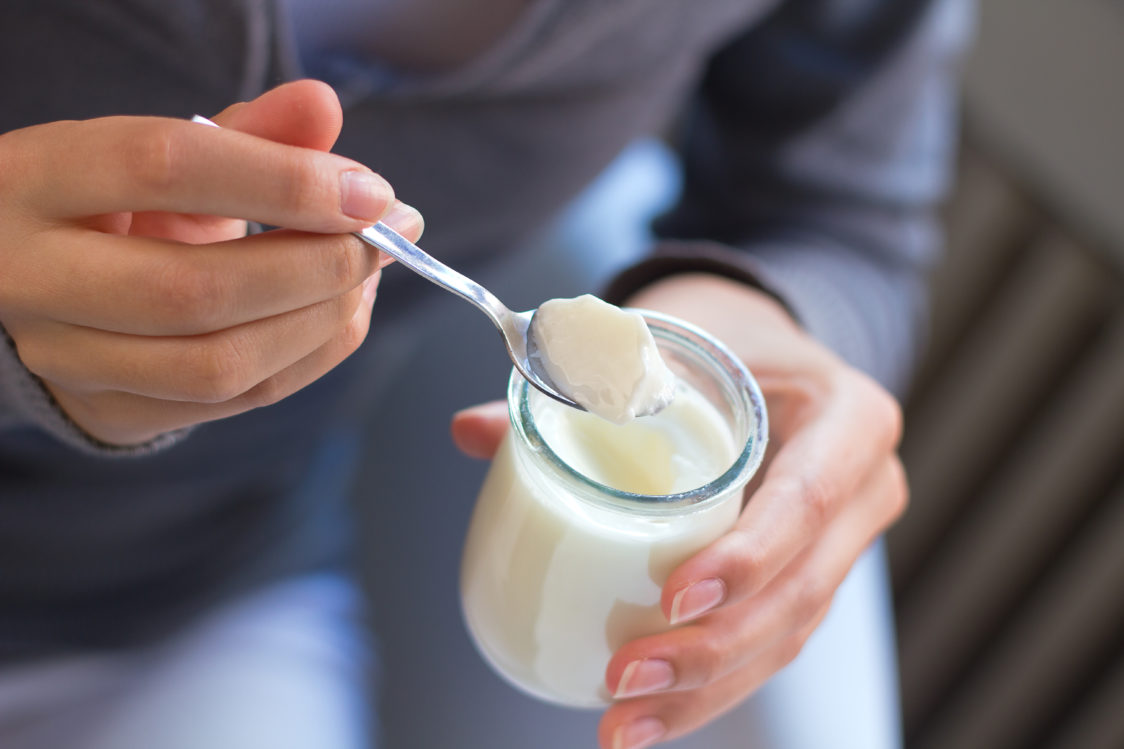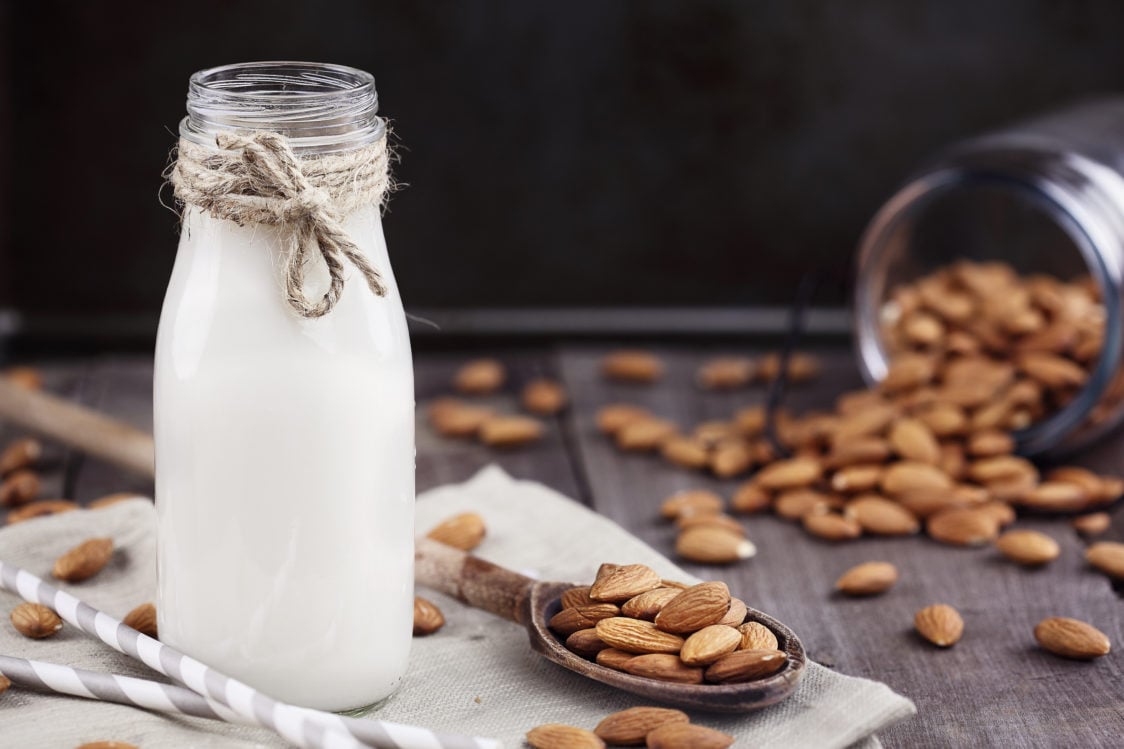Table of Contents
Drinking milk and consuming dairy products are undoubtedly very important for children because they are a source of nutrients for their proper development. And what about us adults? Do we have to, should we, should we not or do we not have to drink milk? Is milk and its products just an appetizer for us? Read in the article whether drinking milk is healthy even for adults, what it contains and much more information.
What is milk?
If you are worried that we will start with a school description of a white opaque liquid, then you are wrong. But in essence, this is not a bad question. What are you willing to consider milk? Is it exclusively an animal product or would you also classify “nut juice” as milk? At this point, you have surely begun to think about what actually belongs to the category of milk. This is not a philosophical question. If we have standards for the content of tomatoes in a product so that it can be called ketchup, is it similar also in case of milk? [1]

Of course, both the United States and the European Union have directives on milk and dairy products. Rather, we find that this issue was addressed by Scott Gottlieb – Commissioner of the FDA (Food and Drug Administration). He stated that among the standards, there is a reference to the animal in lactation, which is a problem because almonds do not have lactate. He even warned that labeling non-dairy products as milk could have health consequences. [1] [2] [3]
What is your attitude? Do you consider a soy drink to be milk or does it have to be honest whole milk? In this article, we will primarily focus on cow’s milk, which is the most popular and most available type of milk.
Milk is one of the most popular drinks on our continent, which is great because, in addition to its delicious taste, it is also a source of nutrients. However, if we take it from the beginning, milk in the animal kingdom is the product of the mammary glands of mammals, which feed the young to milk until they can consume a solid diet. Humans are also mammals, which probably does not need to be mentioned. However, the topic of the article is also related to this, milk is necessary for children, but should we, “older mammals”, also drink it? [4] [6]
Nutrients in milk
Cow’s milk is the predominant type of milk in the world and represents 83% of its total production. Milk is part of the diet of about 6 billion people in the world. It is a great source of energy, protein, amino acids, but also minerals and vitamins. The nutrient content of milk is wide and can be divided into several categories [4] [7] [8]:
Proteins – whey and casein
Carbohydrates – mostly lactose
Fats – including mono- and polyunsaturated fats (omega-3 and -6 fatty acids)
Vitamins – A, D, E, K, B1, B2, B3, B6, B12, folic and pantothenic acid, betaine, and choline
Minerals – calcium, magnesium, phosphorus, potassium, sodium, zinc, selenium, iron

Protein – milk is considered a high-quality source of protein, and milk protein can be divided into 2 basic categories [4] [9] [28]:
Casein – represents about 80% of the protein in milk. One of the properties of casein is its ability to increase the absorption of calcium and phosphorus.
Whey protein – about 20% of the protein in milk. It is a group of globular proteins, the majority of which are alpha- and beta-lactoglobulin, and those in the whey represent about 70 – 80%. The added value is the content of branched chain amino acids – BCAA. In addition, whey protein is one of the most popular sources of protein in the world of nutritional supplements. However, whey proteins are also important for immunity. 10% of whey protein is represented by immunoglobulins that neutralize viruses and bacteria and stimulate immune cells. Whey protein is a source of the amino acid – glutamine, more precisely it contains about 30% of it. Glutamine in the body acts as a “fuel” for the immune system.
Are you interested in the proteins contained in milk? Everything you need to know about casein can be found in the article – Casein and casein protein – everything you need to know.
Various types of milk differ in their nutrient content. Therefore, for a better overview, you will find specific values in the tables taken from the milkfacts.info portal, which is a compilation arranged according to the nutrient database of the United States Department of Agriculture (USDA Nutrient database). In the first table you will find essential nutrients, vitamins, and minerals. Since amino acid intake is important for athletes and physically active people, the second table shows the content of selected amino acids. The nutrient content is indicated on probably the most typical measure of milk – 1 cup (244 g). [5]
Table 1 – content of macronutrients, water and some vitamins and minerals in cow ‘s, goat’ s and sheep ‘s milk.
| cow ‘s milk | goat’ s milk | sheep ‘s milk | ||||
|---|---|---|---|---|---|---|
| full fat (3,25 % fat) | reduced fat content (2 % fat)1 | low fat (1 %)1 | centrifuged1 | |||
| Energy value (kcal) | 146 | 122 | 102 | 83 | 168 | 265 |
| Water content (g) | 215.50 | 217.97 | 219.4 | 222.56 | 212.35 | 197.72 |
| Protein (g) | 7.86 | 8.05 | 8.22 | 8.26 | 8.69 | 14.65 |
Carbohydrates (g)2 | 11.03 | 11.46 | 12.18 | 12.15 | 10.86 | 13.13 |
| Fats (g) | 7.93 | 4.81 | 2.37 | 0.20 | 10.10 | 17.15 |
| Vitamin A (µg) | 68 | 134 | 142 | 149 | 139 | 108 |
| Vitamin B1 (mg) | 0.107 | 0.095 | 0.049 | 0.110 | 0.117 | 0.159 |
| Vitamin B2 (mg) | 0.447 | 0.451 | 0.451 | 0.446 | 0.337 | 0.870 |
| Vitamin B3 (mg) | 0.261 | 0.224 | 0.227 | 0.230 | 0.676 | 1.022 |
| Pantothenic acid (mg) | 0.883 | 0.869 | 0.881 | 0.875 | 0.756 | 0.997 |
| Vitamin D (IU) | 98 | 105 | 127 | 100 | 29 | Not specified |
| Calcium (mg) | 276 | 285 | 290 | 306 | 327 | 473 |
| Phosphorus (mg) | 222 | 229 | 232 | 247 | 271 | 387 |
| Iron (mg) | 0.07 | 0.07 | 0.07 | 0.07 | 0.12 | 0.25 |
| Zinc (mg) | 0.98 | 1.05 | 1.02 | 1.03 | 0.73 | 1.32 |
1 – Added vitamin A.
2 – Carbohydrates determined by difference.
Table 2 – table with amino acid values in cow’s, goat’s, and sheep’s milk.
| COW ‘S MILK | GOAT’ S MILK | SHEEP ‘S MILK | ||||
|---|---|---|---|---|---|---|
| FULL FAT (3,25 % FAT) | REDUCED FAT CONTENT (2 % FAT) | LOW FAT (1 %) | CENTRIFUGED | |||
| Leucine (g) | 0.647 | 0.808 | 0.915 | 0.801 | 0.766 | 1.438 |
| Isoleucine (g) | 0.403 | 0.447 | 0.456 | 0.367 | 0.505 | 0.828 |
| Valine (g) | 0.468 | 0.532 | 0.529 | 0.441 | 0.586 | 1.098 |
| Arginine (g) | 0.183 | 0.261 | 0.234 | 0.176 | 0.290 | 0.485 |
| Histidine (g) | 0.183 | 0.178 | 0.205 | 0.184 | 0.217 | 0.409 |
| Lysine (g) | 0.342 | 0.569 | 0.700 | 0.617 | 0.708 | 1.257 |
| Methionine (g) | 0.183 | 0.203 | 0.203 | 0.152 | 0.195 | 0.380 |
| Phenylalanine (g) | 0.359 | 0.395 | 0.407 | 0.355 | 0.378 | 0.696 |
| Threonine (g) | 0.349 | 0.251 | 0.217 | 0.201 | 0.398 | 0.657 |
| Tryptophan (g) | 0.183 | 0.098 | 0.098 | 0.098 | 0.107 | 0.206 |
| Alanine (g) | 0.251 | 0.271 | 0.259 | 0.245 | 0.288 | 0.659 |
| Glycine (g) | 0.183 | 0.149 | 0.154 | 0.123 | 0.122 | 0.100 |
Advantages and disadvantages of milk consumption
In addition to a great source of nutrients, including proteins, vitamins and minerals, there are other benefits associated with drinking milk.
Milk and healthy bones
One of the key benefits of drinking milk is associated with bone health. This is due to the content of calcium, vitamins D and K, potassium, phosphorus, and protein. We have up to 99% of calcium in our bones and teeth. The calcium content in the diet is important for children for the development, density, and strength of bones, but also for the prevention of bone loss in the elderly. In addition, studies suggest that milk consumption is associated with the prevention of periodontal disease. Calcium is important, but not all studies agree. [6] [7] [12] [18]
An example is the 2019 study, which concludes that increased intake of milk or dairy products is not associated with a lower risk of hip fracture or osteoporosis. [6] [18]
Other research (Feskanich, Bischoff-Ferrari, Frazier, Willett, 2014) states that adult men had a higher risk of hip fracture in adulthood, which was associated with higher milk intake. In particular, each additional cup of milk daily during adolescence increased the mentioned risk of fractures by 9%. On the other hand, a study conducted on adolescent girls (Sonneville, Gordon, Kocher, Pierce, Ramappa, Field, 2012) reports different results. It concludes that vitamin D intake reduced the risk of fractures in adolescent girls with high levels of high-impact activity. Moreover, it also mentions that the intake of calcium and dairy products was not associated with the risk of fractures. [19] [20] [21]

Milk and heart
Consumption of milk and dairy products is not important only for bones, but thanks to its content of potassium, it is important also for heart. Higher potassium intake and at the same time sodium reduction can lower blood pressure. However, it is necessary to drink milk in moderation because it also contains cholesterol and saturated fats, which in turn increases the risk of heart disease. [6]

Various studies are associated with milk. According to some studies, milk can be harmful to the heart. However, a 2014 study examined up to 18 observational studies, and found that dairy intake does not contribute to cardiovascular disease or death caused by it. [13] [14]
Thanks to potassium, milk is beneficial, but you need to be careful about saturated fats in it. Too much saturated fat is as “bad” for the heart as too many refined carbohydrates. [19] [22]
Milk against depression
Of course, milk is not a cure for everything, thanks to which you can get rid of the infamous “black dog” after a glass of milk. On the other hand, it is true that enough vitamin D has a positive effect on the production of serotonin, which also affects, for example, human mood. So that you don’t think we only connect biological processes, the links between depression and vitamin D in 2020 were also addressed by scientists Menon, Kar, Suthar and Nebhinani. Enriching the treatment of depression with vitamin D in people with vitamin D deficiency seems to be a potential benefit. [6] [15]
Are dairy products healthy?
How much milk a day is too much?
As we have already mentioned in previous chapters, milk is rich in nutrients, but at the same time it also contains saturated fats, and with their intake one should definitely not exaggerate. But what does it mean that we should not exaggerate?

One criterion is set out in a report from the 2018 Congress of the European Society of Cardiology. The report was based on 20 studies and found that they did not find a link between heart disease and the consumption of majority of dairy products. However, there is one exception that poses a risk. According to the results, the consumption of high doses of milk, more precisely almost a liter per day, is associated with a higher risk of cardiovascular disease. At the same time, it is true that the American Heart Association (AHA) recommends that adults focus on low-fat or fat-free dairy products. Milk lovers are probably disappointed, but if you are no longer a child, try to approach milk in moderation. [23]
You might be interested in these products:
Yogurts – Are they really healthy?
Definitely yes, yogurts are a nutritionally interesting component of the diet, but not all yogurts can be called healthy. The reasons are added flavors and sugar. You will often find dozens of yoghurts on store shelves, but how do you choose the right one? Here are some tips for you when choosing the right yogurt [24]:
Read what’s on the package – the nutritional chart and the composition of the yogurt can give you a detailed picture of what is hidden under the lid. You will find the content of fat, carbohydrates, and proteins, as well as the proportion of calcium or vitamin D. The composition also mentions, for example, added sugars, which you should probably avoid in a healthy lifestyle.
Full fat or low fat? – If you watch calories, try to focus on low-fat products, but be careful with them as well. They may contain added sugar as compensation for fat. Just check it on the yogurt label. On the other hand, full-fat yoghurts do not have to be a complete “evil”. You can find healthy fats in them, such as conjugated linoleic acid (CLA), which is beneficial for our body.
As for yogurt, then with “live” cultures – probiotic bacteria are literally “living” organisms that are important for the microflora in our intestines. You’ve probably heard of them from various ads that often point to the content of beneficial bacteria. Therefore, if you feel that your digestion would need some help, choose yogurt containing probiotic bacteria. In addition, the taste of such yogurt is bitter because the bacteria in the yogurt convert lactose to lactic acid.

Health and cheese
Are you one of those people who would not be able to give up cheese? In that case, you must be surely interested in knowing whether you do not “spoil” your healthy lifestyle by consuming them. One separate article could be written about cheese, so in this subchapter we will summarize 2 important tips related to cheese and health. [25] [26]
Beware of the fat content – same as for the milk, cheese can be a proper source of fat, even saturated fat – which you need to be careful about. Do you love cheddar? It is excellent, but 28 grams of cheddar can contain up to 6 grams of saturated fat and 120 calories.
Cheese and salt – Another substance you will find in cheese is the sodium content. Too much salt in the diet is a problem, so try to find sodium in addition to calories and fats on the label and compare several types for the right choice. This is because some cheeses may have a low sodium content.

Alternatives to milk
Milk is commonly available and also popular, but a large part of the population cannot or does not want to drink it. Whether you have lactose intolerance, are a vegan, or have an ethical problem with consuming animal products, there is a solution for you. In addition to conventional animal milk, there are also “alternatives” on the market – plant substitutes. These include various types of milk made from almonds, coconuts, or rice. They differ in their taste and nutrient content. [27]

We do not know how to choose a milk alternative for you according to your taste, but we can at least point out the advantages and disadvantages of selected sources of plant milk [10]:
| advantages | disadvantages | |
|---|---|---|
| Soya milk | – Compared to whole milk, it has approximately half the content of carbohydrates and fat. | – content of plant estrogens and hormones |
| Rice milk | – low fat content | – high carbohydrate content |
| Almond milk | – high content of vitamin E | – a small proportion of protein |
| Oat milk | – high fiber content | – low protein content |
| Coconut milk | – low levels of carbohydrates and calories. | – a high proportion of saturated fats |
Who should avoid drinking milk?
It is a little sad to say, but milk is not suitable for everyone. If you find yourself among the points in this chapter, avoid drinking milk or replace it with another drink.
People with lactose intolerance – Lactose intolerance is a relatively common health problem associated with the problem of digesting lactose. While milk allergy is very rare, up to 75% of the world’s population suffers from intolerance. It affects the people of Asia and South America the most.
Its frequent symptoms are digestion problems, such as flatulence, convulsions, or diarrhea. In case of suspicion, it is definitely best to seek professional help, as the doctor is the best to diagnose this problem. Do you suffer from lactose intolerance? Don’t despair, you can still consume, for example, yoghurts with probiotics, or hard cheeses, which usually do not contain lactose. Lactase enzyme supplementation is also helpful for people with lactose intolerance. This is because lactose intolerance occurs with low lactase production in the body. For many people with intolerance, the problems are manifested with higher amounts of milk sugar and may take smaller doses of lactose (about 55 – 115 g). Taking lactase as a nutritional supplement can help prevent bloating, stomach problems or diarrhea. [16] [17] [29]
People with problems after milk consumption – it may seem the same as with lactose intolerance, but even after a negative intolerance test you may have problems after milk consumption. Stomach problems can occur, but you may also experience malaise and even congestion. If you experience any of these symptoms, be aware that it may not be explicitly lactose intolerant. To confirm, consult your physician, or try to exclude dairy products for a while and evaluate for yourself whether you feel better. [16]
The third category of people who have problems with milk and dairy products are those who simply do not like it. Maybe your parents have very strongly explained to you that drinking milk is a “must”. If you have remorse you must literally force yourself because of the calcium consumption, you better choose products and forms of dairy foods that you do not mind. Try to taste the milk or find a cheese that you “enjoy”. Are you worried about calcium levels? You can supplement it with leafy vegetables, legumes, or in the form of nutritional supplements. [16]

Finally, some interesting facts about milk [11]:
Milk also has its day; it is June 1 – World Milk Day.
India is the largest producer of milk.
Milk prevents acidity and reduces stress and fatigue.
Milk is exceptional for the content of vitamin A, which is important for the skin and immunity.
It is a great source of vitamin B12, important for our nervous system.
In this article, we presented you the content of nutrients that you can take by consuming milk. There is a great deal of studies into the health benefits of drinking milk, and our aim was to present both positive and negative findings of scientists. Whether you drink cow’s or almond milk, pour a little into your coffee, or drink a glass a day, we believe we have managed to expand your knowledge about milk. Do you want your friends to know about this topic too? Feel free to support the article by sharing it.
[1] Kathleen Doheny – Food Fight: So, What Is ‚Milk‘? – https://www.webmd.com/food-recipes/news/20180730/food-fight-so-what-is-milk
[2] Standards of Identity for Dairy Products – http://milkfacts.info/Milk%20Processing/Standards%20of%20Identity.htm
[3] Milk & Milk Products – https://ec.europa.eu/food/animals/animalproducts/milk_en
[4] Atli Arnarson BSc, PhD – Milk 101: Nutrition Facts and Health Effects – https://www.healthline.com/nutrition/foods/milk
[5] Nutrient Content of Milk Varieties – http://www.milkfacts.info/Nutrition%20Facts/Nutrient%20Content.htm
[6] Megan Ware, RDN, L.D. – What to know about milk – https://www.medicalnewstoday.com/articles/273451
[7] Hanna Górska-Warsewicz,* Krystyna Rejman, Wacław Laskowski, and Maksymilian Czeczotko – Milk and Dairy Products and Their Nutritional Contribution to the Average Polish Diet – https://www.ncbi.nlm.nih.gov/pmc/articles/PMC6723869/
[8] Milk, whole, 3.25% milkfat – https://nutritiondata.self.com/facts/dairy-and-egg-products/69/2
[9] Seyed Hossein Davoodi, Roghiyeh Shahbazi, Saeideh Esmaeili, Sara Sohrabvandi, AmirMohamamd Mortazavian, Sahar Jazayeri, Aghdas Taslimi – Health-Related Aspects of Milk Proteins – https://www.ncbi.nlm.nih.gov/pmc/articles/PMC5149046/
[10] Noreen Iftikhar, MD – Pros and Cons of Drinking Cow’s Milk – https://www.healthline.com/health/is-milk-bad-for-you
[11] Ashish Roy – Healthy Benefits of Drinking Milk Regularly – https://www.medlife.com/blog/healthy-benefits-drinking-milk-regularly/
[12] Jillian Kubala, MS, RD – 5 Ways That Drinking Milk Can Improve Your Health – https://www.healthline.com/nutrition/milk-benefits
[13] Debjani Arora – Is drinking milk good for your heart? – https://www.thehealthsite.com/fitness/is-drinking-milk-good-for-your-heart-d1117-535247/
[14] Beth H. Rice – Dairy and Cardiovascular Disease: A Review of Recent Observational Research – https://www.ncbi.nlm.nih.gov/pmc/articles/PMC4006120/
[15] Vikas Menon, Sujita Kumar Kar, Navratan Suthar, Naresh Nebhinani – Vitamin D and Depression: A Critical Appraisal of the Evidence and Future Directions – https://pubmed.ncbi.nlm.nih.gov/31997861/
[16] Barbara Brody – MILK ISN’T BAD FOR YOU (BUT 6 TYPES OF PEOPLE MAY WANT TO AVOID IT) – https://www.bornfitness.com/is-milk-bad-for-you/
[17] Helen West, RD – 6 Dairy Foods That Are Naturally Low in Lactose – https://www.healthline.com/nutrition/dairy-foods-low-in-lactose
[18] Hanieh Malmir,Bagher Larijani, Ahmad Esmaillzadeh – Consumption of milk and dairy products and risk of osteoporosis and hip fracture: a systematic review and Meta-analysis – https://www.tandfonline.com/doi/abs/10.1080/10408398.2019.1590800
[19] White Lies? Five Milk Myths Debunked – https://www.pcrm.org/news/blog-0
[20] Diane Feskanich, Heike A Bischoff-Ferrari, A Lindsay Frazier, Walter C Willett – Milk consumption during teenage years and risk of hip fractures in older adults – https://pubmed.ncbi.nlm.nih.gov/24247817/
[21] Kendrin R Sonneville, Catherine M Gordon, Mininder S Kocher, Laura M Pierce, Arun Ramappa, Alison E Field – Vitamin d, calcium, and dairy intakes and stress fractures among female adolescents – https://pubmed.ncbi.nlm.nih.gov/22393172/
[22] Types of Fat – https://www.hsph.harvard.edu/nutritionsource/what-should-you-eat/fats-and-cholesterol/types-of-fat/
[23] Matthew Solan – Dairy: Health food or health risk? – https://www.health.harvard.edu/blog/dairy-health-food-or-health-risk-2019012515849
[24] Taylor Jones, RD – How to Choose The Best Yogurt for Your Health – https://www.healthline.com/nutrition/best-yogurt-for-health
[25] Megan Ware, RDN, L.D. – Is cheese good or bad for you? – https://www.medicalnewstoday.com/articles/299147
[26] Charles Crawford – Reasons Why Eating Cheese Is Bad for You – https://www.lifehack.org/324436/reasons-why-eating-cheese-bad-for-you
[27] Megan Ware, RDN, L.D. – What substitutes are there for dairy milk? – https://www.medicalnewstoday.com/articles/273982
[28] Robert Child – The missing piece: Whey protein’s role in the immunity jigsaw puzzle – https://www.arlafoodsingredients.com/the-whey-and-protein-blog/research/the-missing-piece-whey-proteins-role-in-the-immunity-jigsaw-puzzle/
[29] Lactase Enzyme – https://www.webmd.com/drugs/2/drug-5506/lactase-enzyme-oral/details


Add a comment